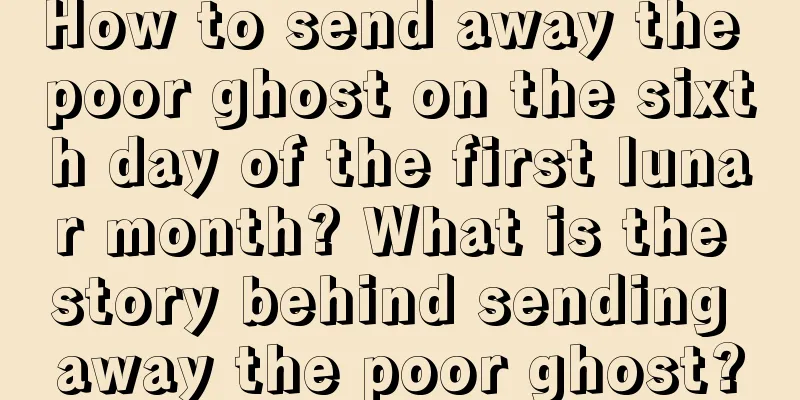How to send away the poor ghost on the sixth day of the first lunar month? What is the story behind sending away the poor ghost?

|
After the excitement and rest of New Year's Eve and the first, second and third days of the first lunar month, people start preparing to open for work on the sixth day of the first lunar month. At this time, every household has to send away the ghost of poverty. So how do you send away the poor ghost on the sixth day of the first lunar month? What is the story of sending away the poor ghost? How to send away the poor ghost on the sixth day of the first lunar month On the sixth day of the first lunar month, people should clean up the garbage, set off firecrackers, or go out for a picnic, which are all ways to send away the poor ghost. According to the "Miscellaneous Notes on the Seasons", the specific way of sending away the poor custom is as follows: "The day before the New Year, people sweep up dung brooms. Before they leave, they cover the dung with seven pancakes and throw them on the main road to send away the poor." Han Yu's "Sending Away the Poor" mentioned that one should "make a cart with willow branches and raise the sail to the wall" for the poor ghost. This means that when sending away the poor, one should prepare symbolic carts and boats for the "poor ghost" and also bring dry food for the "poor ghost". The story of sending away the poor ghostLegend has it that in ancient times there was a Hakka girl named Mei'e who married a rich young man named Jianfu. However, after marriage, Jianfu became addicted to gambling, and the stakes became higher and higher. In two years, he lost all his family property, and finally sold his wife to pay off his gambling debts. Jianfu went from being a rich kid to a beggar. One year during the Dragon Boat Festival, Jianfu happened to be begging for food at Mei'e's house. Mei'e came out and saw that the person begging for food was actually her ex-husband Jianfu. She scooped some food for Jianfu and specifically told him to come back in the afternoon for some rice dumplings. Because Mei'e had a desire to find out the truth, and thinking of the sentiment of "a day of marriage is a hundred days of grace", she made up her mind to help her ex-husband. Without telling her husband, she stuffed seventy taels of silver dollars into seventy rice dumplings. In the afternoon, Jianfu came to Mei'e's house on time to continue begging for food. Mei'e packed seventy rice dumplings with silver dollars in them into a cloth bag and gave it to her ex-husband Jianfu. When they parted, I told him to go back and eat slowly, and after eating, not to go gambling again, but to start a small business to make a living. It was almost dusk, and Jianfu set off in a hurry with the rice dumplings on his arm. He unknowingly reached the riverside and was about to cross the river. However, he had no money, so he had to give a few rice dumplings to the boatman in exchange for the fare. The boatman took the rice dumpling and took a bite. With a "crack", he discovered that there was one or two silver dollars wrapped in the rice dumpling. He then took out a dozen copper coins and bought all of Jianfu's rice dumplings. Later, Jianfu lost all the dozen or so copper coins he earned from selling rice dumplings. On the afternoon of New Year's Eve of that year, Jianfu came to Mei'e's house again to beg for food. At this time, Jianfu was so skinny and ragged that he looked like a nobody. Mei'e was cooking at home. When she saw her ex-husband coming to beg for food, she almost didn't recognize him. Fortunately, Jianfu called Mei'e first, and she recognized it was her ex-husband's voice. After meeting, Mei'e asked Jianfu in surprise: "I gave you seventy taels of silver on the Dragon Boat Festival, how come you spent it all? I thought you were doing business!" Jianfu was puzzled and said: "When did you give me seventy taels of silver?" Mei'e said angrily: "It was all wrapped in the rice dumplings. Did you swallow the silver as well?" When Jianfu heard this, he woke up as if from a dream, and shamelessly told Mei'e the whole process of exchanging rice dumplings for boat fare and selling rice dumplings. When Mei'e heard this, she was so angry that she wanted to beat him up with a fire poker. But then she thought of the love they had as husband and wife, and her hand softened. She said, "You are 'mud that can't be used to stick on the wall'. You are destined to be poor and have no luck." As they were talking, someone came. Mei'e immediately asked Jianfu to hide in the woodshed, and she went to deal with the person herself. That night, the weather suddenly changed. There was a strong wind and heavy snow. Jianfu froze to death in the woodshed due to hunger and cold. Early the next morning, Mei'e went to the woodshed to get firewood and discovered this. Because it was New Year's Day, Mei'e didn't dare to make anything known. She piled up firewood and set fire to Jianfu's body. Early in the morning on the third day of the New Year, Mei'e cleaned up the garbage inside and outside the house and Jianfu's ashes and firewood ashes in the woodshed, and put them into a dustpan. When Mei'e started to carry the things away, she was very clear in her mind; before she started carrying them away, she asked her husband to set off a large string of firecrackers behind her to send her off. When the villagers saw them setting off firecrackers while taking out the garbage, they asked them why. They said perfunctorily: "Send away the poor ghost, send away the poor energy, it is auspicious to send away the poor energy." The villagers saw that his family was gradually getting richer and becoming a millionaire, and they thought it was probably because they had sent away the "poor energy"; therefore, every family in the village rushed to follow suit, setting off firecrackers to send away the garbage swept up early in the morning on the first, second and third days of the New Year as a "poor ghost." From then on, the custom of "sending away the poor ghost on the third day of the New Year" gradually spread and was passed down from generation to generation in Hakka villages. |
<<: Five Elements Dressing Guide on February 9, 2022 Daily Five Elements Dressing Sharing
Recommend
November 3, 2018 lunar calendar
Is it okay to move on November 3, 2018? How about...
A nice name for a girl with the surname Ling
A good name not only implies auspiciousness and g...
A boy's name with the meaning of wisdom
Chinese culture is profound and extensive, and Ch...
100-point name for a girl with the surname Shen
Chinese culture is profound and extensive, and Ch...
The zodiac signs with the most peach blossom luck in 2018 are you one of the zodiac signs that are most likely to meet true love?
Which zodiac sign has the best peach blossom luck...
What is the personality of Gemini people? God has given Gemini eight talents
God loves Geminis, right? Almost all Geminis I ha...
The meaning of the numbers 1 to 9 in the mobile phone number and license plate number of good luck
Among the people, there has been a saying that it...
Ranking of the 12 Constellations Queens: 5 Constellations Women Who Cannot Be Controlled by Men
The Twelve Constellations: When I was talking to ...
Tarot test love who will be your lover at the end of the year
As we enter the end of the year, we must seize th...
Are these six zodiac signs not decisive when breaking up? Are you there?
The end of a relationship is something no one wan...
Revealing the most compatible and incompatible zodiac signs for Pisces
Do you know which signs are most compatible and i...
Personality psychological test questions to test whether you have good friends
Do you have a friendship? What kind of friends sh...
Susan Miller's complete Virgo horoscope for September 2017: New opportunities, new experiences
New opportunities are wonderful, and September is...
Signs of a cheating man - Blood type interpretation of a cheating man
There are many signs that a man is cheating, and ...
Zodiac personality traits: Are Scorpio people like this?
What is the personality of Scorpio? Let's tak...









